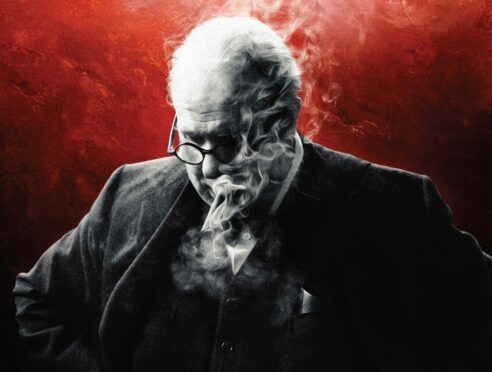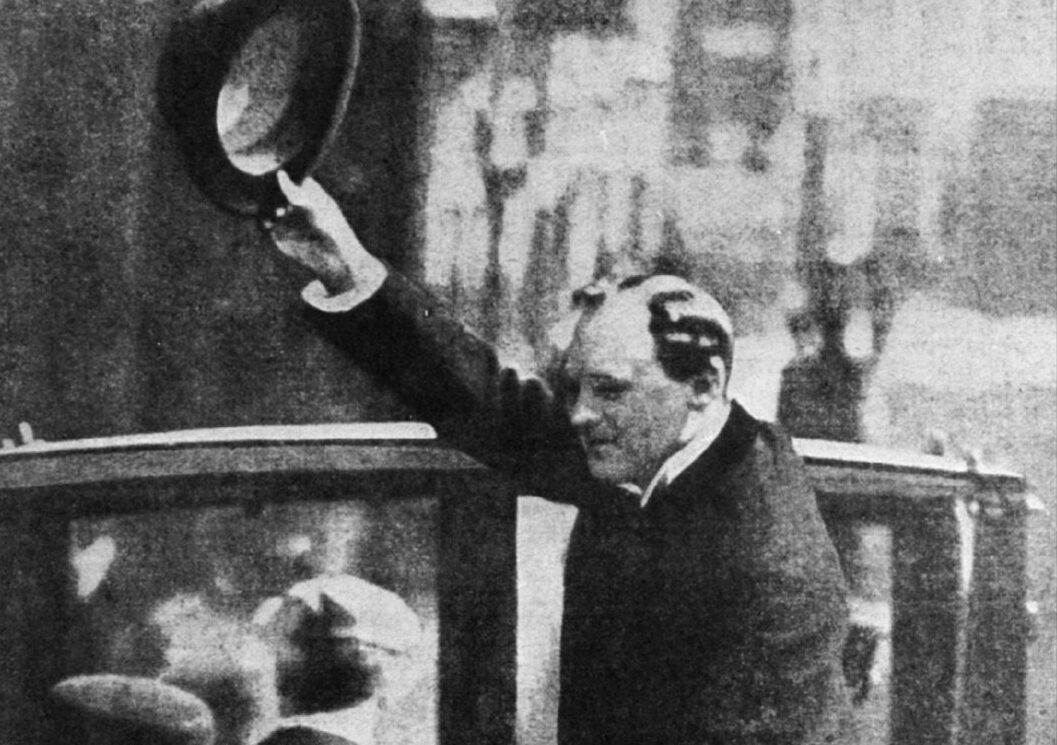
On a cold and blustery night, Winston Churchill collected his belongings from the Royal Terrace Hotel in Dundee and made his way to the station to catch the 9.40pm sleeper to London.
The city’s MP for 15 years had just lost what he once called a “seat for life” in his sixth election campaign and would never return.
As Edwin “Neddy” Scrymgeour – the Scottish Prohibitionist Party founder and the only prohibitionist ever to be elected to the House of Commons – celebrated his victory, Churchill waved farewell to supporters on the platform.
On November 16 this year, it will be 100 years since Churchill, who would become the UK’s most celebrated politician and wartime leader, climbed aboard his train and – in Cheers, Mr Churchill! Winston In Scotland – author Andrew Liddle details the future statesman’s time and impact on Tayside.
He has no doubt Churchill owed his career in politics to Dundee and though 1922 was the end of his connection with the city his experience there, according to Liddle, would shape the rest of his career.
He said: “He didn’t expect to lose his seat there but he went on to even greater things after an extremely important part of his life.”
Churchill, who had been invited to stand in Dundee by the Dundee Liberals (although not unanimously), had a tempestuous time of it between 1908 and 1922, representing constituents of an industrial city reliant on the jute industry where swathes of the population endured terrible poverty and where, reputedly, there were more public houses than baker’s shops.
In the city then known as Juteopolis he faced hostility and heckling at public rallies while, in his final and unsuccessful campaign, Churchill was recovering from life-saving surgery having had a perforated appendix removed four weeks before polling day.
His wife, Clementine, travelled to Dundee to campaign on his behalf. She had her fifth child, two-month-old daughter Mary, with her while another daughter, Sarah, was suffering from tubercular glands in her neck. A year earlier, the couple’s daughter Marigold had died from sepsis.
“Clementine was charismatic, very confident and energetic in her own right, so she represented her husband very well,” said Liddle. “And she had the support of political and good friends on the ground who helped her husband throughout his time there.”
It was to no avail, though, in his last battle for votes with Scrymgeour, whose major platform was total prohibition.
“In his first campaign against Churchill, Scrymgeour performed so poorly he lost his deposit – but he refused to give up,” said Liddle. “I suspect Churchill had a grudging admiration for Scrymgeour but certainly no animosity as there was a mutual recognition that they were dogged and determined men. But, clearly, they neversaw eye to eye.”
Churchill was, however, gracious to the winning candidate and said: “You will find Mr Scrymgeour will have a useful part to play in representing Dundee, where there is such fearful misery, distress and such awful contrast between one class and another. I do not in the least grudge Mr Scrymgeour his victory.”
As an MP for Dundee, Churchill – whose fractious relationship with David Couper Thomson, owner of the city’s newspapers, did little to bolster his election chances – would visit rarely and regularly drew criticism for the lack of time he spent there, with opponents complaining that “constituency interests were subservient to national issues”.
However, Liddle believes the largely absent MP still managed to represent his constituents: “Churchill engaged with local issues both large and small when they appeared – and particularly when they appealed to his individual character.
“In 1912 he made personal efforts to secure a new range of field guns for the Dundee Boys’ Brigade, for instance, and made efforts to persuade the Postmaster General to improve Dundee’s telegram service. Also, getting to and from Dundee in the early 20th Century was no easy task but Churchill cared about constituency matters and was determined to improve living and working conditions for people. It was there he started to develop his stance on social welfare policies.
“He also made major speeches and pronouncements in the city on international affairs as he wanted to put Dundee on the map politically as a place where great and important events happened.”
While he served with valour on the Western Front, went on to be hailed a hero for his leadership during the Second World War, and, 20 years ago, was named the greatest Briton of all time in a BBC poll, there is little recognition in Dundee of his time there.
In 2008 Churchill’s youngest daughter, Mary Soames – the two-month-old baby from the 1922 campaign trail – unveiled a plaque commemorating the 100th anniversary of her father’s original victory.
In the Queen’s Hotel, where he regularly stayed, a second, privately funded plaque was installed around the same time and with it displayed a copy of Churchill’s letter to Clementine in which he complained of finding a maggot in his kipper.
He turned down a Freedom of the City offer in 1943 on the advice of officials mainly because it had not been approved unanimously by councillors.
Some opponents claimed Churchill never forgave Dundee for rejecting him at the ballot box but the former Harrow pupil didn’t display this in any of his public statements and, following the defeat to Scrymgeour, he expressed his profound debt to Dundee.
Churchill said: “My heart is devoid of the slightest sense of regret, resentment or bitterness. On the contrary, looking back over these eventful years in which we have lived and fought through together, I feel I could have done nothing in these stormy times without your loyal and sustained support.
“All my life I will look back with feelings of the deepest regard for Dundee and for those in it who stood faithfully by me.”
Liddle suggests the Liberal MP’s subsequent return to the Conservatives was behind his decision to stay away.
“I think it was a pragmatic and understandable decision. There would be possible embarrassment, an awkwardness.
“It is clear that he retained a fondness for Dundee, even if perhaps over time Dundonians lost their fondness for him.”
Cheers, Mr Churchill! Winston In Scotland by Andrew Liddle is published next month by Birlinn
In the trenches, among the Scots accents and the Glengarries, he began to recover
Andrew Liddle’s book Cheers, Mr Churchill! details the years Britain’s wartime leader spent as MP in Dundee. Here is how the preface begins.
Scotland had a profound impact on Churchill – practically, politically, and personally. Practically, it provided him with a constituency for almost 15 years, five election victories and a platform from which he could launch his Cabinet career.
Crucially, the voters of Dundee backed Churchill during some of his most difficult moments. Without victory in Dundee in 1908, Churchill’s political career would have been in serious jeopardy. Equally, when voters in Dundee chose to endorse Churchill in 1917, they helped cast off the aspersion that he was a political liability in the wake of the failure of the Allied Dardanelles campaign in 1915.
These were two crucial endorsements but the strength of his support was clearly apparent at every election he contested in Dundee until 1922. Even then, as the city voted him out, he received more than 20,000 votes.
Politically and, perhaps most importantly, serving in Scotland changed Churchill’s Liberal perspective from one concerned solely with economics to one that also embraced progressive social reform. Churchill had left the Conservative Party for the Liberal Party in 1904 because of his belief in free trade, and his alignment with the Liberal Party until 1908 was fundamentally due to economic policy.
It was support for free trade that won Churchill the Manchester North West constituency in 1906, and it was international affairs that dominated his ministerial career between then and 1908.
It was only once he became MP for Dundee – and came to more fully understand poverty, slums and ill-health – that his political priorities evolved and he became a champion of social, as well as economic, progress.
Personally, and most prosaically, Scotland also had a profound social and private influence on Churchill’s life. His wife, Clementine, hailed from Angus and Churchill retained many lifelong friends from Dundee and wider Scotland.
His holidays in places such as Aberdeenshire and East Lothian provided much-needed respite from the trials and tribulation of high office. Most importantly, it was a Scottish regiment that helped Churchill recover when, in 1916, his career was at its lowest ebb.
With his mental health under strain, Churchill took command of the 6th Battallion, Royal Scots Fusiliers, and it was in the trenches, among the Scottish accents and Glengarries, that he began his recovery.

Enjoy the convenience of having The Sunday Post delivered as a digital ePaper straight to your smartphone, tablet or computer.
Subscribe for only £5.49 a month and enjoy all the benefits of the printed paper as a digital replica.
Subscribe © PA
© PA © SYSTEM
© SYSTEM